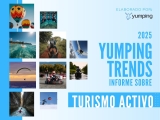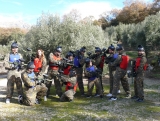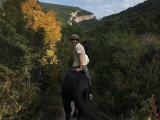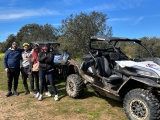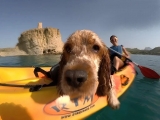Adrián Kaperotxipi is an athlete who has dedicated almost his entire life to surfing and for some time now, he has been writing on his own blog, sharing his experiences within the world of this sport. He also collaborates with and is followed by other surfers who, like him, have hearing impairments.
Yumping.- When did you start in the world of surfing?
Adrián Kaperotxipi.- I started surfing when I was about 10 years old, when my brother Iñaki was a surfer and encouraged me. I tried surfing, and on the first day, I stood up on the surfboard easily and fell in love with this sport.

Y.- You grew up in a privileged location, as not all Spanish beaches have good waters for surfing. Has this made your daily training easier?
A.K.- I believe this fact has helped me, as it gives me the opportunity to watch and learn to surf.
Y.- What obstacles did you face when you first started this sport?
A.K.- Initially, I don’t remember facing any obstacles—quite the opposite. With my brother’s help and living in a place where I can walk to the sea to surf, I think I’ve had more advantages than obstacles.
Y.- Over the years of practising, who has been your best teacher?
A.K.- I think I’ve been self-taught, watching how others did it. Back then, there weren’t surf schools like there are now, so I watched videos and surfed a lot.
Y.- Have you had support from the people around you?
A.K.- I couldn’t name one specific person, but all the surfers in general who were by my side, giving me advice—or even me advising them. It’s a supportive world; if you see someone doing something wrong, or they see you, you say it for their benefit.
Y.- When did you start competing?
A.K.- I started competing at 13 and stopped at 20 because I began working mornings and afternoons. I didn’t have time to train, and I also had surgery on both knees, which kept me away from surfing for nearly two years. On top of that, I got bored of competing—I didn’t fancy travelling to other towns. I prefer surfing freely. The only competition I took part in was the World Deaf Surfing Championship, and this year I’m not competing due to my knee injuries—I’ve been recovering for almost eight months and am now getting back in shape!

Y.- Of all the places you’ve travelled to and all the waves you’ve surfed, which ones stand out?
A.K.- I’d highlight my time in Mexico and Australia—the waves were perfect. It was a pleasure and very easy to surf.
Y.- For some time now, you’ve had a blog specialised in surfing for the deaf. How did this idea come about?
A.K.- Because it’s a topic that interests me greatly. At first, it was somewhat aimed at deaf people, but in the end, I just wanted to share all the information that was useful to me with anyone interested.
Y.- Have you received collaborations from other surfers?
A.K.- Honestly, I haven’t needed any help, but I’ve spent time with other surfers on several occasions, and we’ve all had a great time.
Y.- Do you think people with certain disabilities, however minor, have a harder time practising adventure sports?
A.K.- In my case, no. But it’s worth noting that there are many types of disabilities, and some may hinder or discourage people from practising certain sports. I believe we should encourage all kinds of sports—and in my case, especially surfing.

Y.- In a way, does your blog serve as a place for "raising awareness" or more as a platform for deaf surfers to feel supported?
A.K.- It serves to share my experiences, both positive and negative, and, where possible, to address the negative. Ultimately, it’s about fostering empathy.
Y.- Do you receive any grants for travelling to championships? If not, do you think there should be more support?
A.K.- There’s a huge need for more than what’s currently offered. It’s very difficult to get any funding, but you have to try. I’ve only managed to get some support from Kirolgi.
Y.- Your next goal?
A.K.- To go to Brazil and compete in the World Deaf Surfing Championship, as I won the Grand Master Longboard title a year ago and want to defend it.
Y.- A dream?
A.K.- To return to Australia to surf. And for my deaf son to compete in three years’ time in Portugal, where the championship will be held.

Y.- Where do you see yourself in ten years?
A.K.- I’ll try to stay as I am now and, of course, keep surfing. But I prefer to enjoy the moment and not think too far ahead.
Y.- What advice would you give to someone who wants to start a sport like surfing?
A.K.- I’ve already started introducing my children to the world of surfing. My advice would be to go to the beaches, watch surfers, talk to them about their experiences, watch videos, and take a surfing course...






